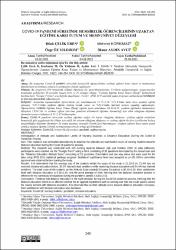Covid-19 pandemi sürecinde hemşirelik öğrencilerinin uzaktan eğitime karşı tutum ve memnuniyet düzeyleri
Künye
EREN D. Ç, KORKMAZ M, YILDIRIM Ö. Ö, AVCİ İ. A (2021). COVID-19 PANDEMİ SÜRECİNDE HEMŞİRELİK ÖĞRENCİLERİNİN UZAKTAN EĞİTİME KARŞI TUTUM VE MEMNUNİYET DÜZEYLERİ. Anadolu Hemşirelik ve Sağlık Bilimleri Dergisi, 24(2), 246 - 254. Doi: 10.17049/ataunihem.862820Özet
Öz:Amaç: Bu araştırma Covid-19 pandemi sürecinde hemşirelik öğrencilerinin uzaktan eğitime karşı tutum ve memnuniyetdüzeylerinin incelenmesi amacıyla tanımlayıcı olarak yapılmıştır.Yöntem: Bu araştırma 416 hemşirelik bölümü öğrencisi ile, gerçekleştirilmiştir. Verilerin toplanmasında; araştırmacılartarafından geliştirilen 26 sorudan oluşan form ve 21 sorudan oluşan “Uzaktan Eğitime Karşı Tutum Ölçeği” kullanılarakkatılımcılara "Google Formu" aracılığıyla ulaşılmıştır. Veriler, SPSS 21.0 istatistik paket programı kullanılarak korelasyonve one way anova testi kullanılmıştır.Bulgular: Araştırma kapsamındaki öğrencilerin yaş ortalamasının 21.13±2.14, %71.4’ünün daha önce uzaktan eğitimalmamış, %35.3’ünün uzaktan eğitim alırken teknik sorun ve %54.4’ünün internet sorunu yaşadığı saptanmıştır.Öğrencilerin, Uzaktan Eğitime Karşı Tutum Ölçeği toplam puan ortalaması 66.50±6.05, uzaktan eğitimden memnuniyetdüzeyleri 5.85±2.34, ve uzaktan eğitim sürecinin pandemi döneminde eğitimin devamlılığı için etkin olduğunu düşünmedurumları puan ortalaması 6.55±2.42 bulunmuştur.Sonuç: Covid-19 pandemi sürecinde uzaktan eğitimin doğru bir karar olduğunu düşünme, uzaktan eğitim modelininhemşirelik gibi uygulamalı bir bölüm için etkili bir yöntem olduğunu düşünme ve uzaktan eğitim ile ders içeriklerine hızlıcaulaşabildiğini düşünme durumları ile tutum puanları arasında önemli fark bulunmuştur. Uzaktan eğitime karşı tutum puanıarttıkça uzaktan eğitime yönelik memnuniyetlerinin de arttığı görülmektedir. Aim: This research was conducted descriptively to examine the attitudes and satisfaction levels of nursing students towards distance education during the Covid-19 pandemic process. Method: This research was conducted with 416 nursing students between July and October 2020. In data collection, participants were reached via the "Google Form" using a form consisting of 26 questions developed by the researchers and the "Distance Education Attitude Scale" consisting of 21 questions. Correlation and one way anova test were used for the data using SPSS 21.0 statistical package program. Statistical significance level was accepted as p<.05. Ethics committee approval was obtained before starting the study. Results: It is determined that the average age of the students within the scope of the study is 21.13±2.14, 71.4% has not received distance education before, 35.3% has technical problems while receiving distance education and 54.4% has internet problems. The total score of the students on the Attitude Scale towards Distance Education is 66.50±6.05, their satisfaction level with distance education is 5.85±2.34, and the point average of their thinking that the distance education process is effective for the continuity of education during the pandemic period is 6.55±2.42. Conclusion: Thinking that distance education is the right decision during the Covid-19 pandemic process, thinking that the distance education model is an effective method for an applied department such as nursing and that one could quickly access the course content with distance education. It is observed that as their attitude score towards distance education increases, their satisfaction with distance education also increases.
















